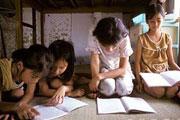UN Urges Expansion of Bilingual Education for Ethnic Minorities

Despite the country’s progress in boosting economic growth, Vietnam’s ethnic minorities continue to remain the poorest of the poor. As everyone recognizes how education plays a major role in uplifting a community and a country from poverty, the minorities’ lack of adequate opportunities to be taught in their own language during their early years of education has been found to be a huge roadblock. Bilingual education intends to help minority children to make better early progress and acquire a strong and culturally appropriate foundation for their future schooling.
Bilingual education is the teaching of Vietnamese and an ethnic minority language (the mother tongue). In Vietnam, which has as many as 53 ethnic groups, its being a multi-ethnic and multilingual nation caused children from such communities to be disadvantaged and denied of learning. Such prompted the need for two-language teaching so as to break down the linguistic barriers, and give young Vietnamese an equal footing in early education. Some form of bilingual has been implemented since the 1920s and for a long period now, the UNICEF had backed efforts of the Ministry of Education and Training in implementing mother-tongue based bilingual education activities in three provinces – Lao Cai, Gia Lai and Tra Vinh – on a pilot basis in H’mong, Jrai and Khmer languages.
But such programs have not been as sustainable to close the wide economic gap between many minorities and the rest of the country. United Nations has seen the necessity for more access to quality and appropriate education for the minorities. Such will help these groups better eradicate poverty in their communities. Bilingual teaching in a number of areas face many challenges including: a proper ratio of teaching periods to different subjects not being achieved and a lack of teachers for bilingual curricula. The lack of material and teaching instruments to carry out bilingual curricula is also another obstacle for a number of regions. The bilingual educational plan in Vietnam has shown encouraging results by far, but the many difficulties that lie ahead needs to be addressed. A full report on the need for the expansion of the program is expected to be presented to the UN Human Rights Council in March 2011.









